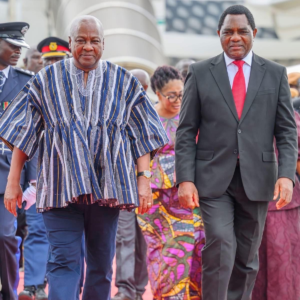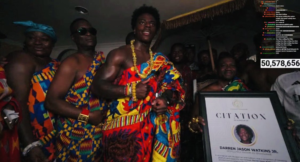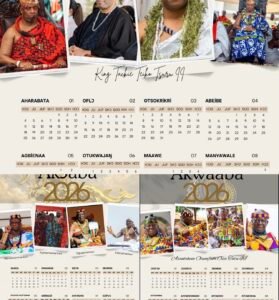
Over the years, a term has emerged that sends chills down the spines of many who attend entertainment shows in Ghana – The Kwashe Boys. These individuals have carved a reputation for themselves as a notorious group operating in the shadows of Ghana’s music and entertainment scene. Known for their fierce acts of robbery, often using sharp weapons to intimidate their victims, they strike fear into unsuspecting revelers. This feature sheds light on the rise of the Kwashe Boys, exploring the etymology of the word, their tactics, their impact on public events, and the growing concern they pose to entertainment lovers across the country.
When music shows and entertainment events are announced in Ghana, particularly with the venue disclosed, one of the first concerns for prospective attendees is the looming threat of the Kwashe Boys. These notorious individuals have become synonymous with fear and insecurity at public gatherings.
In December 2024, when Ghana’s celebrated music icon, Kofi Kinaata, announced the Takoradi Sports Club as the venue for the highly anticipated return of his annual Made in Taadi Concert, a wave of excitement swept across the nation. However, for many Ghanaians, the announcement also reignited concerns about the potential threat posed by the Kwashe Boys. The venue, located along Takoradi’s Beach Road, raised further apprehension, as its accessibility and layout could make it a target for these unscrupulous individuals.
It is not just Kofi Kinaata’s event; nearly every entertainment program held late into the night brings an underlying sense of fear among attendees because of the infamous Kwashe Boys. These low-budget pickpockets and armed robbers have cultivated what can only be described as a “dark art,” a trade designed to satisfy their selfish and envious desires by robbing and attacking people at weapon point. But where did the term Kwashe Boys originate? To understand their rise, it is essential to trace the roots of this term and the cultural factors that have enabled these individuals to thrive in the shadows of Ghana’s entertainment scene.
Preliminary etymological research into the term “kwashe”, as used in Kwashe Boys, has led to various analyses pointing to its linguistic roots in both the Ga and Hausa languages of Ghana. It is believed that the term kwashe originates from a combination of the Ga word for mouse ‘kwakwe’ and the Hausa term ‘shege’. The inclusion of mice in this context is fascinating. In Ga culture, as well as in many parts of Ghana, mice are perceived as thieves that cause significant harm to property by chewing and destroying belongings, a behaviour that reflects the actions of the Kwashe Boys.
Meanwhile, in Hausa, shege means “to destroy” or “to cause violent harm to someone.” In this context, Akans do even say “Mebɛyɛ wo shege” – to mean “I will destruct you.” The fusion of these two powerful terms kwakwe and shege captures the essence of the destructive and thieving nature of these individuals, resulting in the term Kwashe Boys.
There is another perspective on the origin of the term “Kwashe,” which suggests that it may have evolved from the Anglicized version of the Akan male name “Kwesi.” According to this view, the name “Kwesi” traveled with Ghanaian emigrants to the diaspora, where it became transformed into “Quarshie” or “Kwashey.” Over time, this name took on a negative connotation, particularly in the Americas, where it became used as a slur.
The term also has historical roots in the interactions between different African groups, notably the Ashanti and the Yoruba. It is believed that the Yoruba used the term “Quashey” to mock or insult the Ashanti people. This likely stemmed from the complex political and military dynamics in West Africa during the time, when certain ethnic groups, including Fanti, other Africans, and West Indians, were enlisted to fight for the British in wars against the Ashanti Empire. In this context, “Kwashe” became a term associated with those who fought against or bullied others, particularly in the context of colonial conflicts.

Thus, the term “Kwashe” appears to have evolved from a personal name to a slur that carried a heavy historical and cultural significance, linking it to themes of conflict, betrayal, and mockery within the complex relationships between different African groups and the colonial powers.
The addition of “Boys” highlights the fact that such activities are typically carried out by young males engaging in this form of social injustice. Kwashe Boys often target their victims by lying in ambush late at night, waiting for attendees of entertainment shows to pass by so they can attack them. Their primary targets are gadgets, especially mobile phones, as well as cash. Victims are threatened with sharp weapons and other harmful materials out of fear, surrendering their belongings. Those who resist or attempt to fight back are often attacked and left injured.
In some cases, victims who anticipate harm deliberately destroy their gadgets in the presence of their attackers to render them useless. For those who have nothing of value on them, the Kwashe Boys often leave them with cuts or scars from their weapons, warning them to “bring something next time” when attending such events.
To curb the activities of the Kwashe Boys, event organizers have started closing night events typically around 6 AM, as daylight robbery is seen as less likely to occur. Attendees are also advised to move in groups of two or three for added security. Additionally, security personnel are strategically stationed throughout the venue to prevent the Kwashe Boys from carrying out their attacks.
These measures aim to create a safer environment and reduce the risk of robbery during late-night shows. The rise of the Kwashe Boys has become a significant concern for both event organizers and attendees in Ghana. Their violent and opportunistic behaviour has forced organizers to adopt measures such as morning event closures and increased security to ensure the safety of participants. While these efforts help reduce the threat, the menace of Kwashe Boys remains a persistent challenge. It is crucial for both the public and authorities to stay vigilant and take proactive steps to combat this growing issue, ensuring that entertainment events can once again be enjoyed without fear.
Editor: Ama Gyesiwaa Quansah








This issue? I hope it changes in the future.
Thank you